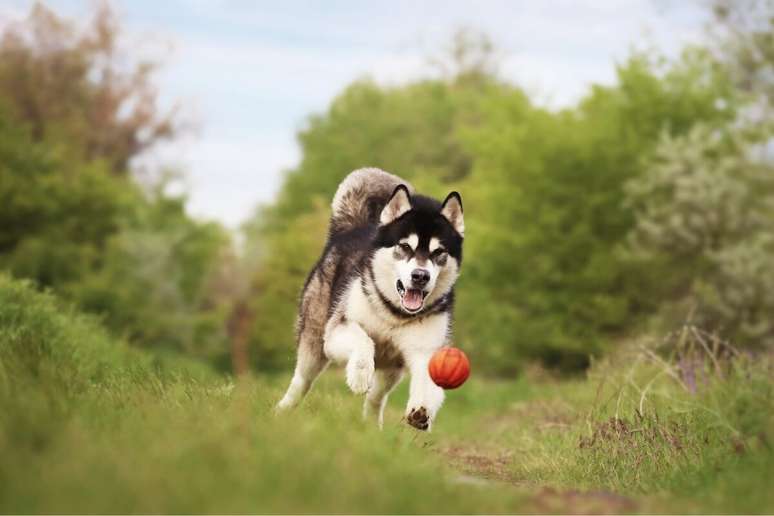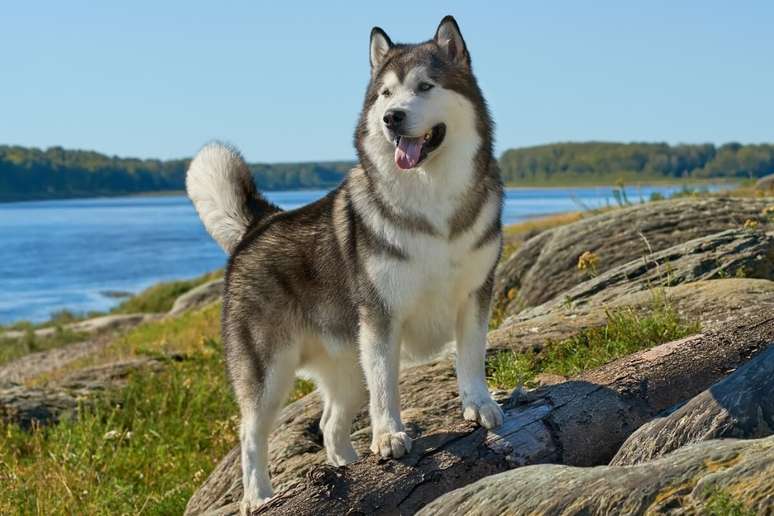This dog enchants owners both with its physical size and its personality.
With a majestic appearance and a fascinating history, the Alaskan Malamute is one of the oldest sled dog breeds. It was developed by Inuit tribes in the Alaska region. Its name, in fact, derives from Mahlemut, a people who lived along Norton, on the northwestern coast of the American territory.
This dog was bred for essential tasks, such as pulling sleds loaded with supplies and assisting in hunting, playing a vital role in the survival of people in the Arctic. Today it is recognized as a symbol of strength, resilience and loyalty, winning admirers around the world.
Below, check out 4 characteristics of the Alaskan Malamute dog!
1. Physical appearance
The Alaskan Malamute is robust and muscular. According to the official breed standard of the Brazilian Canine Confederation (CBKC), it features a coat double and dense layer that protects you from the intense cold. Their colors range from light gray to black, with the lower body generally white.
The large head, triangular ears and voluminous muzzle give the malamute an alert – he always seems attentive – and friendly expression. It is larger than many sled dogs, males measuring approximately 63.5 cm at the withers and weighing 38.5 kg.
2. Temperament and personality
The malamute is affectionate and loyal, as well as very sociable. According to CBKC he is not a “single owner” dog, that is, he is sociable with everyone and very playful, especially when young. Furthermore, it needs a lot of space to consume energy. Despite his energy and enthusiasm, he shows serenity as he matures, making him an excellent companion for families who appreciate his active and curious character.

3. Health care and nutrition
Because of its strong constitution, the malamute needs a balanced diet and rich in nutrients. Therefore, the owner must offer high-quality food and adapt the portions according to the dog’s activity level. Being subject to joint problems and hip dysplasia, attention to weight and moderate physical activity is recommended, avoiding excessive efforts. Additionally, the thick coat requires regular brushing to prevent matting and maintain the health of the undercoat.
4. Education and socialization
Despite being friendly, the Alaskan Malamute is an independent and intelligent dog, which can make it difficult for inexperienced owners, as it tends to be a little resistant to training. However, he responds well to positive reinforcement and constant training, starting as a puppy.
It is essential to avoid socializing your malamute with other dogs and people behaviors territorial. His pack instinct is strong, so he tends to get along with other dogs if properly integrated.
Source: Terra
Ben Stock is a lifestyle journalist and author at Gossipify. He writes about topics such as health, wellness, travel, food and home decor. He provides practical advice and inspiration to improve well-being, keeps readers up to date with latest lifestyle news and trends, known for his engaging writing style, in-depth analysis and unique perspectives.







